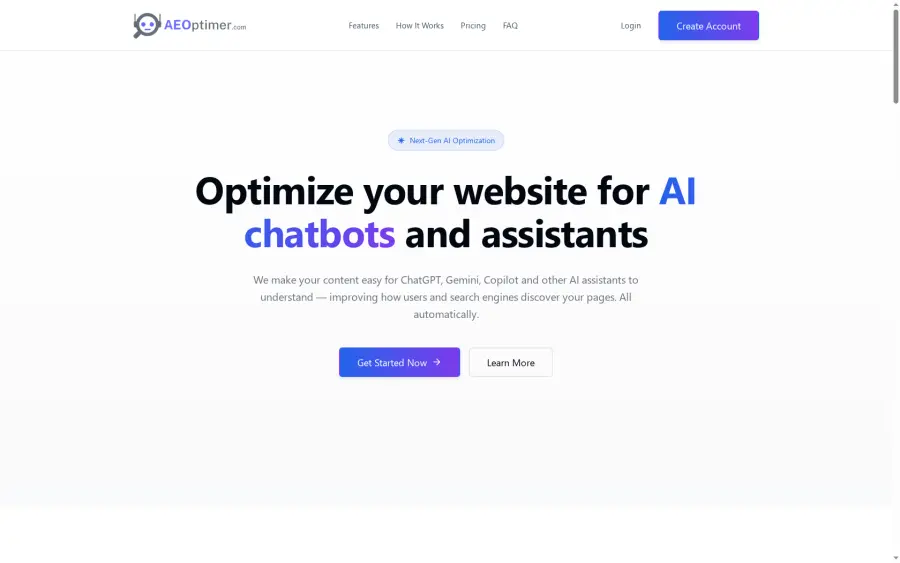What Is AI Search? Complete Overview for 2025

Over 90 percent of online experiences begin with a search engine, and now artificial intelligence is changing the way people find information. As AI search systems become more advanced, their ability to understand user intent and deliver precision results shapes which websites stand out. Grasping these new AI-driven search methods means navigating a smarter, faster path to increased online visibility and a more personalized user experience.
Table of Contents
- Defining AI Search And Core Concepts
- Major Types Of AI Search Technologies
- How AI Search Engines Work
- Key Use Cases For Website Visibility
- SEO Benefits And Potential Challenges
Key Takeaways
| Point | Details |
|---|---|
| Understanding AI Search | AI search transforms problem-solving through strategic exploration, utilizing algorithms to navigate complex state spaces effectively. |
| Types of AI Search | There are two primary categories: uninformed methods for exhaustive searching and informed methods using heuristics for efficient navigation. |
| AI Search Engines | These engines leverage machine learning and natural language processing to deliver personalized, context-aware search results, enhancing user experience. |
| SEO Implications | AI search radically changes SEO by improving content visibility and relevance, necessitating agile content strategies sensitive to evolving algorithms and user intent. |
Defining AI Search and Core Concepts
Artificial Intelligence (AI) search represents a sophisticated computational approach that transforms problem-solving into a strategic exploration of potential solutions. According to research from the Computer Science Education Database, AI fundamentally encompasses developing intelligent agents capable of learning, reasoning, and solving complex problems across multiple domains.
At its core, AI search involves representing problems as intricate state spaces, where each state represents a potential solution configuration. Researchers have identified key techniques like breadth-first, depth-first, and A* search algorithms that systematically navigate these spaces. These methods allow computational systems to evaluate multiple potential paths, strategically selecting the most efficient route to achieving defined goals.
The practical applications of AI search are remarkably diverse. From route optimization and game strategy to complex decision-making in scientific research, these techniques enable machines to process information far beyond traditional computational boundaries. Key characteristics of effective AI search include:
- Intelligent path selection
- Dynamic problem representation
- Adaptive learning mechanisms
- Efficient computational strategies
By transforming abstract problems into navigable state spaces, AI search empowers systems to make intelligent decisions, learn from previous iterations, and continuously refine their problem-solving approaches. This dynamic capability represents a significant leap in computational intelligence, bridging the gap between raw data processing and genuine cognitive reasoning.
Major Types of AI Search Technologies
AI search technologies are fundamentally divided into two primary categories: uninformed search methods and informed search methods. According to research from the Computer Science Education Database, these approaches differ significantly in how they leverage problem-solving strategies and domain knowledge.
Uninformed search methods, also known as blind search techniques, operate without specific information about the problem’s structure or potential solution paths. Classic examples include breadth-first search and depth-first search. These approaches systematically explore potential solutions by expanding search trees or graphs without using any specialized knowledge about the problem’s characteristics, essentially trying every possible route methodically.
In contrast, informed search methods utilize domain-specific heuristics to guide the search process more efficiently. Techniques like A search* and hill-climbing algorithms incorporate intelligent strategies to prioritize more promising solution paths. These methods dramatically reduce computational complexity by:
- Utilizing problem-specific knowledge
- Estimating potential solution quality
- Minimizing unnecessary exploration
- Focusing computational resources on most likely solutions
The strategic selection between uninformed and informed search technologies depends on the specific problem’s complexity, available domain knowledge, and computational resources. While uninformed methods provide comprehensive exploration, informed techniques offer targeted, intelligent navigation through complex solution spaces, representing a sophisticated approach to computational problem-solving.

Here’s a comparison of uninformed and informed AI search methods:
| Criteria | Uninformed Search | Informed Search |
|---|---|---|
| Main Approach | No domain knowledge | Uses heuristics |
| Examples | Breadth-first Depth-first |
A* search Hill-climbing |
| Efficiency | Slower Examines many paths |
Faster Focuses on best paths |
| Use Cases | Comprehensive exploration | Targeted problem-solving |
| Computational Cost | High | Reduced |
| Strategy | Systematic Exhaustive |
Intelligent Selective |
How AI Search Engines Work
Artificial Intelligence (AI) search engines represent a revolutionary approach to information retrieval, transforming how we access and understand digital content. According to research from GeeksforGeeks, these advanced systems leverage machine learning and natural language processing to analyze massive datasets and deliver highly personalized, context-aware search results.
At the core of AI search engines are sophisticated algorithms that go far beyond traditional keyword matching. These systems use complex neural networks to interpret user intent, understanding the nuanced relationships between words and the underlying meaning of queries. By processing large volumes of data, AI search engines can identify intricate patterns and connections that traditional search mechanisms would typically miss, creating a more intuitive and intelligent search experience.
The operational mechanics of AI search engines involve several key processes:
- Continuous learning from user interactions
- Real-time query interpretation
- Contextual understanding of search intent
- Personalized result ranking
- Dynamic knowledge graph generation
By combining advanced machine learning techniques with deep semantic analysis, AI search engines can provide results that are not just relevant, but predictive and adaptive.
They learn from each interaction, continuously refining their understanding of user needs and improving the precision of search results. This dynamic approach represents a significant leap from traditional search technologies, transforming search from a simple matching exercise to an intelligent, responsive information discovery process.
Key Use Cases for Website Visibility
Website visibility has been dramatically transformed by AI search technologies, offering unprecedented opportunities for digital presence optimization. According to research from GeeksforGeeks, AI search engines now enhance website discoverability by understanding user intent and contextual nuances far beyond traditional search mechanisms.
The primary use cases for improving website visibility through AI search revolve around intelligent content personalization and behavioral analysis. By processing complex user interaction data, AI systems can strategically position websites in search results that align most closely with specific user preferences and search patterns. This means websites are no longer just static digital entities but dynamic, adaptive platforms that can be intelligently optimized for maximum visibility.
Key strategic approaches for leveraging AI search to boost website visibility include:
- Semantic content optimization: Aligning website content with user intent
- Behavioral pattern analysis: Understanding and predicting user search behaviors
- Dynamic content adaptation: Continuously updating content based on user interactions
- Personalized search result positioning: Tailoring content presentation to individual user profiles
- Contextual relevance mapping: Connecting website content to broader user interests
By embracing AI-driven search strategies, websites can transform from passive information repositories to intelligent, responsive platforms that dynamically engage with user needs. This approach not only improves search rankings but creates a more intuitive, personalized digital experience that connects content creators directly with their most relevant audience segments.
SEO Benefits and Potential Challenges
AI search technologies are revolutionizing Search Engine Optimization (SEO), presenting a complex landscape of unprecedented opportunities and significant challenges. According to research from GeeksforGeeks, these advanced systems offer profound benefits while simultaneously demanding continuous strategic adaptation from digital content creators.
The most significant SEO benefits emerge from AI’s ability to deliver personalized and context-aware search results. By understanding nuanced user intent and behavioral patterns, AI search engines can dramatically improve content relevance and visibility. This means websites that intelligently align their content with user expectations are more likely to achieve higher rankings and increased organic traffic.
However, the AI search ecosystem presents several critical challenges for SEO professionals:
- Rapidly evolving algorithms: Constant technological shifts require continuous learning
- Complex ranking criteria: Moving beyond traditional keyword optimization
- Increased competition for visibility: More sophisticated content requirements
- Need for dynamic content strategies: Regularly updating and refining website content
- Advanced user intent interpretation: Understanding deeper contextual search signals
Successful navigation of the AI search landscape demands a proactive, adaptive approach. Websites must develop flexible content strategies that prioritize user experience, semantic relevance, and genuine value. By embracing AI’s sophisticated understanding of content, digital platforms can transform potential challenges into opportunities for unprecedented visibility and user engagement.
Boost Your Website Visibility with Automated AI Search Optimization
The article highlights the growing complexity of AI search engines and their advanced ability to understand user intent through semantic analysis and dynamic content adaptation. If you struggle with keeping up with rapidly evolving AI search algorithms or want to overcome the challenge of ensuring your website stands out in AI-driven search results, you are not alone. Key pain points include the need for continuous content updates, aligning with sophisticated ranking criteria, and maintaining high discoverability without technical headaches.
aeoptimer.com offers a seamless solution by automatically optimizing your website for AI assistants and search engines. Our platform adds structured data and AI-friendly enhancements without changing your site’s visual appearance. With features like automatic sitemap detection, monthly crawls, and manual review options, your website stays up-to-date with the latest search trends and AI requirements. This means better rankings, increased organic traffic, and greater AI recognition with minimal effort on your part.
Take control of your website’s AI visibility today and let automation work for you.
Unlock smarter SEO and visible results now.
Improve your site with aeoptimer.com and explore how automated AI optimization can help you outpace competitors.
Get started today on our platform and see the difference AI search technology makes.
Learn more about AI search benefits to stay ahead in your industry.

Frequently Asked Questions
What is AI search and how does it work?
AI search refers to advanced computational methods that utilize artificial intelligence to transform problem-solving into strategic explorations of potential solutions. It typically involves representing problems as state spaces and employs algorithms like A*, breadth-first, or depth-first search to navigate these spaces efficiently.
What are the main types of AI search methods?
AI search methods are mainly categorized into uninformed search methods and informed search methods. Uninformed methods, such as breadth-first and depth-first search, explore solution paths without specific knowledge. Informed methods, like A* and hill-climbing algorithms, utilize heuristics to guide the search more efficiently, focusing on promising solution paths.
How do AI search engines enhance website visibility?
AI search engines leverage machine learning and natural language processing to interpret user intent and contextual nuances in search queries. This allows them to optimize website content dynamically, personalize search results, and position sites to align more closely with user preferences, improving overall discoverability.
What are the SEO implications of using AI search technologies?
AI search technologies offer significant SEO benefits by delivering personalized and context-aware results. However, they also pose challenges, such as keeping up with rapidly evolving algorithms and complex ranking criteria. Successfully adapting to these changes requires continuous learning and flexible content strategies focused on user experience and semantic relevance.





